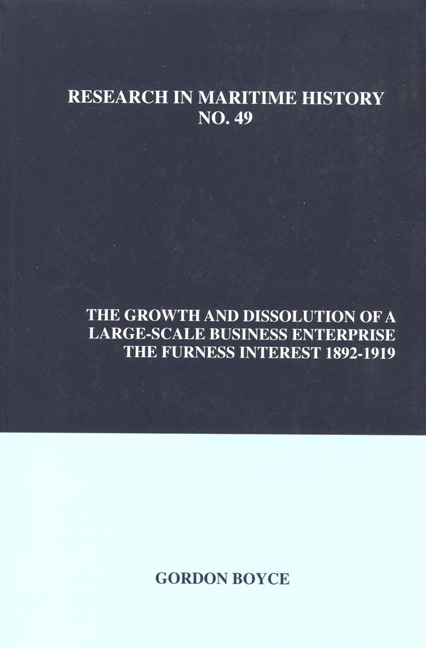Book contents
- Frontmatter
- Table of Contents
- About the Author
- Acknowledgements
- Figures and Tables
- Introduction
- Chapter 1 Furness' Shipping Services: Growth by Organic Means in the 1880s
- Chapter 2 The 1890s: Furness Withy's Expansion by Acquisition and Promotion
- Chapter 3 Diversification into the Industrial Sector, 1895-1901
- Chapter 4 Trouble on the Transatlantic Route: The Formation of the IMM and Furness' Response
- Chapter 5 The Growth of Shipping Services, 1902-1909
- Chapter 6 Industrial Operations and Performance, 1900-1914
- Chapter 7 The Growth of the Shipping Interests, 1910-1919
- Chapter 8 Structure
- Chapter 9 Finance
- Chapter 10 Holding Company Investment Activities and Intermediary Operations
- Chapter 11 Personnel
- Chapter 12 Furness
- Chapter 13 Dissolution
- Appendix 1 Development of the Combined Fleet, 1900-1919
- Appendix 2a Patterns of Ownership: The Furness Group, 1919
- Appendix 2b Reorganization of Branch Offices and Superintending Departments, 1911-1912
- Appendix 3a Fluctuations in Freights, Profits, Tonnage Afloat and Merchant Shipping Output
- Appendix 3b Output of Merchant Tonnage (Excluding Warships), 1892-1913
- Appendix 3c Fluctuations in the Price of a 7500-ton Cargo Steamer, 1898-1913
- Appendix 4 Development of the Furness Group: Principal Promotions, Acquisitions and Divestments, 1880-1919
- Appendix 5 Northern Allies and Maritime Associates
- Appendix 6 Contemporary Accounting Law and Conventions, 1845-1914
- Appendix 7 Lord Furness' Movements, 1899-1912
- Bibliography
Chapter 1 - Furness' Shipping Services: Growth by Organic Means in the 1880s
- Frontmatter
- Table of Contents
- About the Author
- Acknowledgements
- Figures and Tables
- Introduction
- Chapter 1 Furness' Shipping Services: Growth by Organic Means in the 1880s
- Chapter 2 The 1890s: Furness Withy's Expansion by Acquisition and Promotion
- Chapter 3 Diversification into the Industrial Sector, 1895-1901
- Chapter 4 Trouble on the Transatlantic Route: The Formation of the IMM and Furness' Response
- Chapter 5 The Growth of Shipping Services, 1902-1909
- Chapter 6 Industrial Operations and Performance, 1900-1914
- Chapter 7 The Growth of the Shipping Interests, 1910-1919
- Chapter 8 Structure
- Chapter 9 Finance
- Chapter 10 Holding Company Investment Activities and Intermediary Operations
- Chapter 11 Personnel
- Chapter 12 Furness
- Chapter 13 Dissolution
- Appendix 1 Development of the Combined Fleet, 1900-1919
- Appendix 2a Patterns of Ownership: The Furness Group, 1919
- Appendix 2b Reorganization of Branch Offices and Superintending Departments, 1911-1912
- Appendix 3a Fluctuations in Freights, Profits, Tonnage Afloat and Merchant Shipping Output
- Appendix 3b Output of Merchant Tonnage (Excluding Warships), 1892-1913
- Appendix 3c Fluctuations in the Price of a 7500-ton Cargo Steamer, 1898-1913
- Appendix 4 Development of the Furness Group: Principal Promotions, Acquisitions and Divestments, 1880-1919
- Appendix 5 Northern Allies and Maritime Associates
- Appendix 6 Contemporary Accounting Law and Conventions, 1845-1914
- Appendix 7 Lord Furness' Movements, 1899-1912
- Bibliography
Summary
Between 1870, when Furness began his business career, and the outbreak of the First World War, expanding international trade created a rapidly growing market for shipping services, though one that was subject to acute cyclical fluctuations. During this period, Britain's foreign trade alone increased in value by over 150 percent. Up to 1901, the most salient feature of British trade growth was the imbalance between the value of imports and exports. Although exports rose by forty percent between 1870 and 1901, imports increased by more than seventy-two percent. Growing competition from industrializing countries in the manufacture of certain classes of goods explains in part the slower growth of Britain's exports, but the steady increase of the country's population (31.2 million in 1870 and 45.6 million in 1913) was the principal cause of the disproportionate rise in imports. After 1870, population growth generated a level of demand for food and raw materials that exceeded the domestic capacity to supply. Moreover, up to the late 1890s, rising real incomes strengthened the purchasing power of the expanding population and stimulated the growth of imports. These trends induced Britain to extend and diversify its sources of supply.
British investment abroad helped to fund the development of new sources of foodstuffs and raw materials. As supplies increased, the prices of many commodities declined steadily during the last quarter of the nineteenth century. The value of Britain's foreign investments rose throughout the period, giving particular strength to the trend of falling prices up to the late 1890s, when there was a brief setback; although estimates vary, it appears that by 1914 the country had committed close to £4000 million abroad. A considerable portion was devoted to the construction of the foreign railways, ports and ancillary facilities required to provide improved access to raw materials and to reduce the cost of transporting the increasing volume of goods destined for Britain.
Improvements in ship construction and marine propulsion, coupled with a dramatic increase in the size of the world's merchant fleet - Britain's merchant marine alone nearly trebled in size during the period - led to a complimentary decline in the cost of seaborne transport. Between 1870 and 1914, ocean freight rates fell by fifty percent as measured by the Cairncross index.
- Type
- Chapter
- Information
- The Growth and Dissolution of a Large-Scale Business EnterpriseThe Furness Interest, 1892-1919, pp. 15 - 34Publisher: Liverpool University PressPrint publication year: 2012

